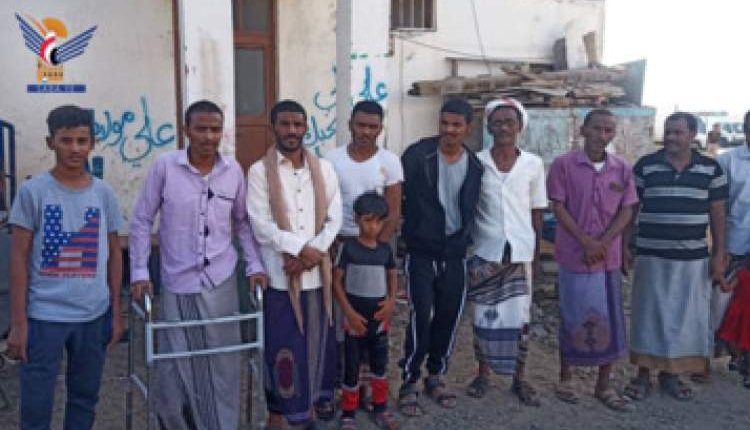Arrival of 13 Fishermen in Hodeidah after Five Months of Detention in Sudan without Guilt
Governor of Hodeidah Mohammad Ayash Qahim praised the efforts of the Committee for the Follow-up and Protection of Fishermen’s Cases and its active role in following up the release of 13 fishermen who had been detained for five months in Sudan.
Fishermen were kidnapped when their boat broke down at sea and imprisoned by the Port Sudan authorities. They were released after the Fishermen Protection Committee assigned a lawyer there and the Zakat office paid the fines it ruled against them, even though they had not committed any violations.
Governor Qahim considered the kidnapping and imprisonment of fishermen in Sudan a crime, especially since they are looking for a living, and their involvement in any transgressions has not been proven except that they work in the fishing profession to obtain the livelihood of their families.
Meanwhile, the deputy head of fisheries in the Red Sea Mohammad Al-Omeisy explained that the fishermen were released with joint cooperation and coordination between the Fisheries, the leadership of the governorate, the Zakat office in the governorate, and the Fishermen Support Fund Committee.
For his part, Deputy Director of the Zakat Office in the governorate Mohammad Al-Was confirmed that the fishermen were followed up and their families were taken care of during their imprisonment and kidnapping for more than five months, and the financial fines that were imposed on them by the Port Sudan were paid.
The fishermen explained that their boat had a malfunction while they were fishing in the sea, so they headed to the nearest place to them near Sudan. They were detained and their boat, equipment and everything they owned were confiscated, imprisoned and each of them sentenced to a fine of 300,000 Sudanese pounds.
They confirmed that they were treated harshly during their imprisonment and that they carried out hard labor, despite the critical health condition that some of them suffer from.
They appreciated the efforts of the governorate’s leadership, the Zakat, the Fisheries, the Committee for the Follow-up and Protection of Fishermen’s Cases, and everyone who contributed to following up their case until their release, payment of financial fines, and their arrival to their families.
Coastal communities in Yemen have suffered greatly in the ongoing bloody war. Fishing boats, ports and processing sites have been destroyed or damaged, and many fishermen have lost their lives.
The US-Saudi-led coalition launched airstrikes which hit fishing boats and markets, and mines were laid in the sea making the waters treacherous. To make matters worse, the exacerbation of piracy and attacks by the Eritrean authorities and the aggression forces against fishermen on the Yemeni coasts.
Since late 2014, the Eritrean Navy has escalated piracy, detention and arrest operations against many Yemeni fishermen while they are engaged in their activities off the Hanish Archipelago. The archipelago includes the Greater and Lesser Hanish Islands and Jabal Zuqar, and is administratively affiliated to the Al-Hodeidah Governorate in western Yemen.
Fishing activity in the Red Sea has become a threat to the lives and safety of Yemeni fishermen. While a war is taking place throughout the Yemeni geography, another is taking place in the islands, coasts and international waters, the aggressors of which are the Eritrean maritime authorities and whose victims are thousands of Yemeni fishermen.
On the shores of Hodeidah, located on the Red Sea, extending from the port of Hodeidah to Bab al-Mandab, thousands of fishermen are being chased by the maritime authorities of the coastal African country. Fishermen accused the navy of imprisoning them for long periods, in addition to the harsh treatment they receive in prisons and the confiscation of their fishing boats.
As of August 2019, at least 334 fishermen had been reported killed or injured since 2015, according to statistics from Yemen’s fisheries authority. Others had been arrested and had their boats seized, while some were now detained in Saudi-run prisons in Yemen.
Local reports estimate that of Yemen’s approximate 100,000 fishermen, since 2015 over a third (37,000) have quit and thus lost their income.fishermen and the fish sector in Yemen.

